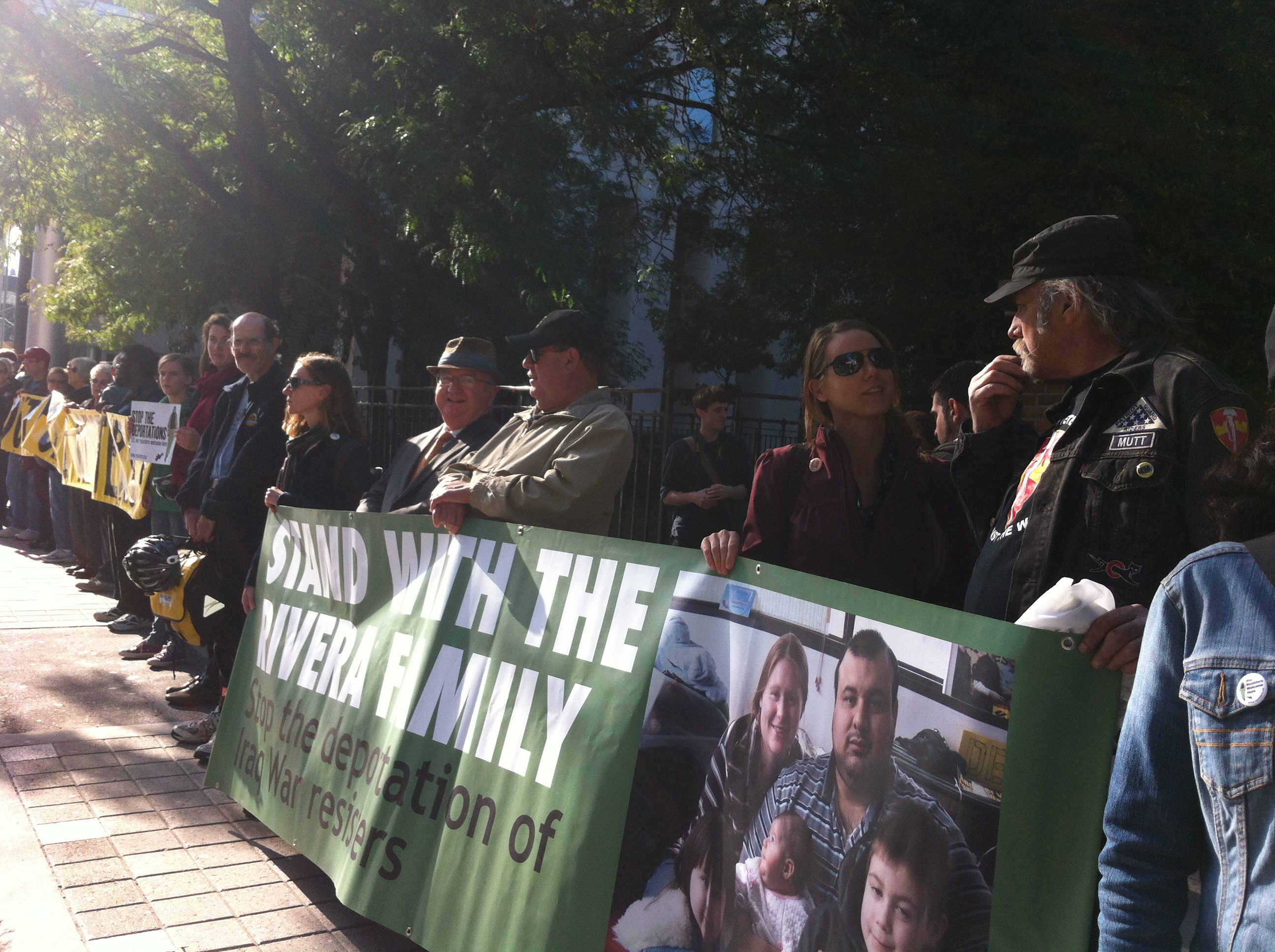Iraq war resister Kim Rivera climbed into a friend’s car in the late afternoon on Wednesday September 19, 2012, and drove away from Toronto. She had to present herself at the U.S. border to follow through on the deportation order placed against her. Her family crossed the border separately to avoid traumatizing her children by seeing their mom taken into custody.
Her crime, she refused to fight in the Iraq War; first by refusing to carry her weapon, and when disciplined for that, she refused to carry ammunition during her three month tour in Iraq. Her refusal to fight in the illegal Iraq War eventually led her to cross the border into Canada while on leave to seek sanctuary here as a war resister in 2007.
On Thursday, August 30, 2012, Iraq war resister Kim Rivera received notice of her impending deportation on September 20, 2012. Despite a last minute attempt to intervene through the Federal court to stop her deportation – in order to wait for the important results of a Humanitarian and Compassionate grounds application (H&C) – her request was denied.
So Kim Rivera was forced from this country, taken into custody yesterday morning at the border to be court martialed for desertion from the army branch of the U.S. military. She faces a felony conviction and up to five years in prison.
The decision to deport and prosecute Kim Rivera highlights a failure in our society to be able to admit our wrongs and make amends.
Reverend Desmond Tutu, in Monday’s Globe and Mail editorial, made a plea to understand the kind of courage it takes for someone to admit they made a mistake and changed their mind. While the U.S. government has not shown such courage, Kim Rivera has.
“It is large-hearted and courageous people who are not diminished by saying: ‘I made a mistake.’ Not least among these are Ms. Rivera and the other American war resisters who determined they could not in good conscience continue to be part of the Iraq war.”
This ability to grow morally as a person in times of war has its place in international law in regards to war resister cases — including in Canada with the case of war resister Jeremy Hinzman — and the international definition of conscience objection status to military service. This status has been cited in Hinzman’s case by his legal team, in regards to his own H&C decision.
“The beliefs and motivations of Mr. Hinzman were of important significance to the ultimate decision, given the context of an H&C application. The appellants had also provided some evidence that the right to conscientious objection `is an emerging part of international human rights law’ [Zoljagharkhani v. Canada (Minister of Employment and Immigration), (1993) 3 F.C. 540 (FCA), at paragraph 15].
The United Nations defines a conscientious objector as an “individual who, on religious, moral or ethical grounds, refuses to participate as a combatant in war or, in some cases, to take any role that would support a military organization.”
Amnesty International believes that the right to refuse military service for reasons of conscience is inherent in the notion of freedom of thought, conscience and religion as recognized in Article 18 of the Universal Declaration of Human Rights (UDHR) and Article 18 of the International Covenant on Civil and Political Rights (ICCPR). Amnesty International has declared war resisters like Kim Rivera and Jeremy Hinzman both as “conscientious objectors”.
A conscientious objector (C.O.) is broadly defined by the United Nations as an “individual who, on religious, moral or ethical grounds, refuses to participate as a combatant in war or, in some cases, to take any role that would support a military organization.
Jeremy Hinzman, the first Iraq war resister to come to Canada, said of his moral refusal to fight in the Iraq war, “Just because you volunteer to do something, it doesn’t mean that your ability to be a moral being should become static.”
The same is true of Kim Rivera who took steps to distance herself from the actions of her unit and the U.S. Army while in field. This refusal to fight in the Iraq theatre was not sudden and not an act of selfishness or shirking of duty, but from a continually developing, deep moral belief.
Regarding the attitude of the American government towards conscience objectors, the U.S. Selective Service System states, “Beliefs which qualify a registrant for conscientious objector status may be religious in nature, but don’t have to be. Beliefs may be moral or ethical; however, a man’s reasons for not wanting to participate in a war must not be based on politics, expediency, or self-interest.”
Thus, Kim Rivera does fall into their category. With a healthy and sound mind, she realized she had made a mistake in enlisting – under the national fog of war that gripped the U.S. from the September 11 terrorist attacks and the manic search for weapons of mass destruction – in the army and refused to fight.
Now in the U.S. custody and facing a court martial, should Kim have to face up to five years in prison for refusing to kill?




